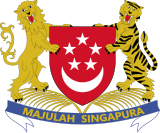
| This article is part of a series on |
 |
|---|
|
|
The right to vote in Singapore is not explicitly stated in Singapore's Constitution, but the Government has expressed the view that it may be inferred from the fact that Singapore is a representative democracy and from specific constitutional provisions, including Articles 65 and 66 which set out requirements for the prorogation and dissolution of Parliament and the holding of general elections. Speaking on the matter in Parliament in 2009, the Minister for Law, K. Shanmugam, said that the right to vote could not be a mere privilege as this would imply the existence of an institution superior to the body of citizens that is empowered to grant such a privilege, but that no such institution exists in a free country. In 1966 a Constitutional Commission chaired by Chief Justice Wee Chong Jin advocated entrenching the right to vote within the Constitution, but this was not taken up by the Parliament of the day. When this proposal was repeated during the 2009 parliamentary debate, the Government took the view that such entrenchment was unnecessary.
In Taw Cheng Kong v. Public Prosecutor (1998), the High Court suggested on an obiter basis that voting is a privilege rather than a right. It has been suggested by law academic Thio Li-ann that, if called upon to decide the issue, the court might infer the existence of the right to vote in the Constitution from its text and structure, and from the fact that it is an adaptation of the Westminster system of democracy. If the right to vote were to be found to be implicit in the Constitution, the judiciary would be better able to protect the right when issues arise before the courts.
The Parliamentary Elections Act and Presidential Elections Act regulate the exercise of the vote and set out the procedures for parliamentary and presidential elections in Singapore. These are ordinary statutes which can be changed by a simple majority in Parliament. All Singapore citizens not less than 21 years old on the cut-off date for the registration of electors (1 January of a particular year), and ordinarily resident in the country, are entitled to vote in both parliamentary and presidential elections. A one person, one vote system is currently in operation, though in 1994 Senior Minister and former Prime Minister Lee Kuan Yew suggested that people aged between 35 and 60 who were married with children should be given two votes each due to their greater responsibilities and contributions to society. Overseas voting was introduced in 2001, and first carried out during the 2006 general election.
A person is disqualified from voting in certain circumstances, which include engaging in acts incompatible with being a Singapore citizen, being of unsound mind, or being in prison for committing a criminal offence. The constitutionality of the statutory provisions denying prisoners the right to vote has not yet become an issue in Singapore, though it has been controversial in some foreign jurisdictions.